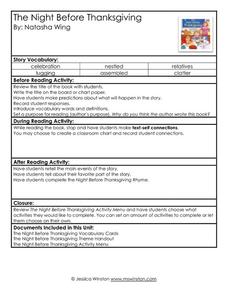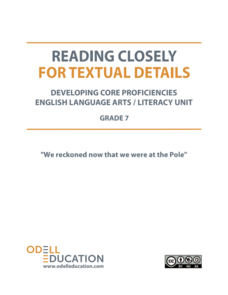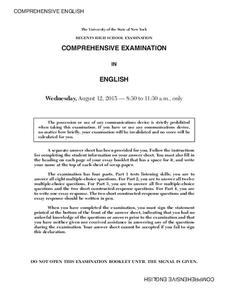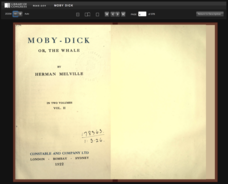Teacherfiles
Character Connections
Making connections with characters in literature is a great way to engage young children in reading. This task is made much easier with this Venn diagram template that asks young learners to compare and contrast themselves with a...
Curated OER
Author Study: Cynthia Rylant
Explore the life's work of one of the great children's authors using this ten-lesson author study unit. After first performing some whole-group research into the life of Cynthia Rylant, the class goes on to read six different...
Curated OER
The Night Before Thanksgiving
Natasha Wing's story The Night Before Thanksgiving is a great way to incorporate rhyme and literature into the Thanksgiving season. Learners make text-to-self connections, recall main events, and choose post-reading activities...
Green Hope High School
Close Readings from The Tempest + New World Readings
What was Shakespeare's intent? That is the question at the heart of a summer assignment designed for AP English Literature. Class members focus on five scenes from The Tempest and compare the interactions of Prospero, Caliban,...
EdHelper
George Washington's Socks by Elvira Woodruff
A solid, straightforward book report form is an excellent addition to your literature unit. Class members note the main characters, point of view, plot elements, and other important details from a story, adding their favorite part...
K12 Reader
Point of View: Who Is Telling the Story?
See how famous books of literature have different perspectives with a short activity. After reviewing the difference between first and third person points of view, learners look over six passages from various novels and decide which...
Houghton Mifflin Harcourt
Writing Prompts for Middle School
Scratching your head when it comes to engaging writing prompts? Check out a list of prompts designed for middle school classes, which includes topics for persuasive writing, expository writing, how-to essays, personal narratives, and...
E Reading Worksheets
Tone: Voice of the Speaker
Tone and mood are easy to use interchangeably—and yet they are very different elements of literature. Help middle schoolers discern between the way a speaker feels about his or her subject and the way the audience is meant to feel with a...
Odell Education
Reading Closely for Textual Details: Grade 7
Enhance the reading experience with a set of lessons designed to improve textual analysis. Seventh graders use guiding questions to read both informational text and literature closely in the first part of the unit. Next, they work on...
Curated OER
The Metamorphosis: Vocabulary Bingo
Franz Kafka's The Metamorphosis is one of the most fascinating pieces of literature from the 20th century, and its rich vocabulary is one of the reasons it has endured for over a century. Help learners of all levels work...
Manchester College
What’s Your Point of View?
Work on deciphering the point of view of various pieces of literature. As readers review the concepts of first, second, and third person perspective, they apply what they know to different passages.
Thoughtful Education Press
Compare and Contrast
Encourage readers to compare and contrast the information that they find in informational text with a variety of reading passages and worksheets. Learners read all about subjects in science, social studies, and literature...
Houghton Mifflin Harcourt
Surprise!: Extra Support Lessons (Theme 2)
Surprise! is the theme of a unit covering such topics as consonants, blending, short vowels sounds, high frequency words, and number words. The unit's lessons also include teachable moments covering story structure, illustrations,...
Teacher's Corner
Dr. Seuss Story Map
Guide young readers through their first book report with a story map designed for a Dr. Seuss book. After your class finishes their story of choice, they list the title, characters, conflict, and other elements of literature on the book...
Curriculum Corner
Inferencing
Inferencing is a necessary reading skill to uncover non-explicit messages in text. Use the set of resources as a way to guide learners toward becoming expert inferrers through reading prompts and literature with text and without text.
Prestwick House
In Cold Blood
In Cold Blood, Truman Capote's groundbreaking work in the world of nonfiction literature, is the focus of a quick review resource. Readers solve a crossword puzzle that offers clues about the book's characters and events.
Houghton Mifflin Harcourt
One Land, Many Trails: Challenge Activities (Theme 5)
Bring history to life through literature. The first in a series of three challenge activities designed to accompany Theme 5: One Land, Many Trails does just that through unique projects connected to historical fiction and nonfiction...
West Corporation
Making Inferences – Use Your Mind to Read!
How can you tell if someone is happy? The lesson works with elementary and middle school scholars to activate their schema and pay attention to details to make inferences in their daily lives, poetry, and other literature. Cleverly...
Trinity University
Julius Caesar: The Power of Persuasion
"Friend, Romans, countrymen, lend me your ears..." Those words begin one of the most persuasive speeches in literature. Explore the elements of persuasion in a series of lessons related to William Shakespeare's Julius...
New York State Education Department
Comprehensive English Examination: August 2015
Looking at literature through a critical lens helps readers connect the text to the larger world. An essay examining the theme "There is no ill in the world without a remedy" forms the main part of a sample comprehensive English...
New York State Education Department
Comprehensive English Examination: June 2016
Those in positions of authority don't always have the best interest of their people in mind. As part of a sample assessment question, readers must consider how works of literature they read apply to a quote from Edmund Burke—"The greater...
Great Books Foundation
Discussion Guide for Handmaid's Tale
Great literature discussions are a consequence of carefully crafted questions, interpretative questions that permit more than one response, and responses supported by specific evidence from the text. The discussion questions in a guide...
Library of Congress
Moby Dick
Few first lines of literature are as well-known as the first line from Moby Dick by Herman Melville. Readers discover the classic text that contains these lines using a digital eBook. The online version contains page-by-page...
Wuthering Heights
The Reader’s Guide to Emily Bronte's Wuthering Heights
Researching the characters, setting, and background history of a work of literature enhances interest and improves reading comprehension. An interactive website contains a wealth of resources related to Emily Bronte's novel Wuthering...
Other popular searches
- Spanish Art and Literature
- Literature and Art
- Visual Art and Literature
- Chinese Art and Literature
- Art and Literature Acre
- Art and Literature Acroi
- Art, Literature and Science
- Art Literature and Science
- Multicultural Literature Art
- Art and Literature Connection

























